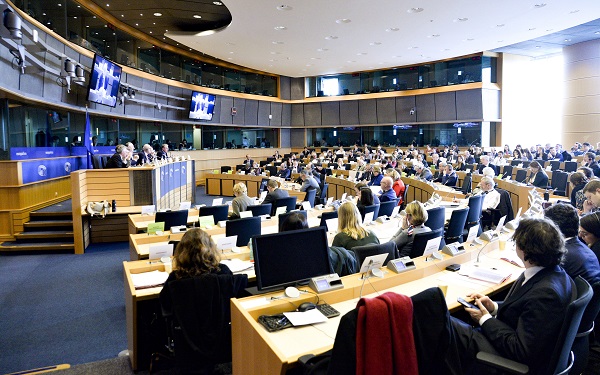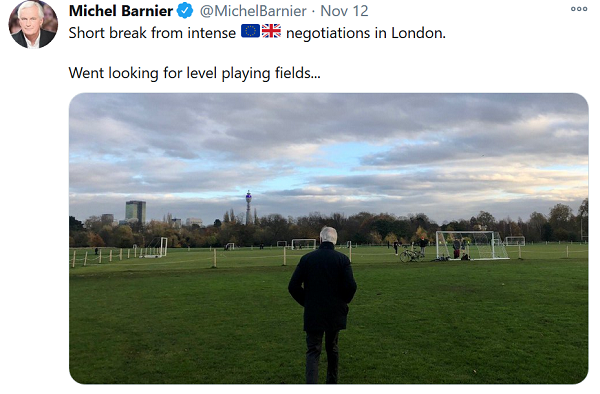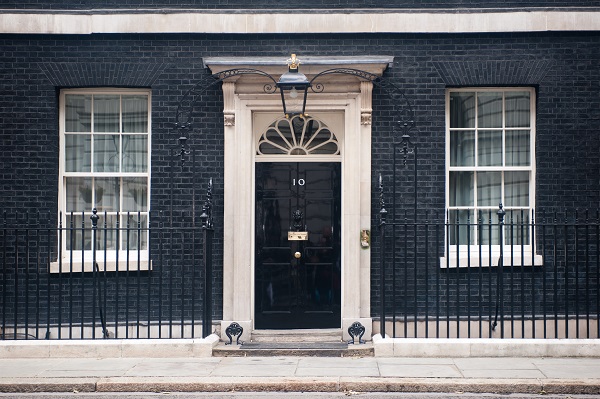Brexit Brief Newsletter
16 November 2020

Introduction
Welcome to the Brexit Brief. With 45 days to go until the end of the transition period, the state of play appears much the same, with the UK and EU unable to agree on three core issues: governance, the level playing field, and fisheries. We consider statements made by stakeholders in recent days, as well as the joint letter from Arlene Foster and Michelle O’Neill to the European Commission on the potential difficulties around food supplies to Northern Ireland. There is some good news regarding medicines supply and regulation; and the UK Government has announced new measures to improve the transparency and accountability of relations with the devolved administrations.
45 days to go
This week the UK negotiating team is in Brussels, and talks continue. UK Chief negotiator David Frost has pointed to progress, stating the teams now largely have common draft treaty texts, although significant elements are not yet agreed. Sticking points remain fisheries, the level playing field and governance. The focus is on “non-regression clauses” which would mean that the EU and UK would meet the same standards (for example environmental and labour standards) when producing goods which would be sold in the other bloc’s market. The EU is insisting on an “evolution clause” so that the two sides do not move away from common standards over time. It appears that little movement has been made on fisheries, with reports stating the two sides remain far apart.
The Internal Market Bill remains an issue: Irish Foreign Minister Simon Coveney told Sky News on Sunday that the EU will not ratify a deal on the future relationship if the controversial clauses in the Internal Market Bill still stand, saying, “there’s no way the EU would agree to ratify a new agreement if the British government is breaking the existing agreement – which is not even 12 months old.” Last week the House of Lords voted to remove from the Bill these controversial clauses on the Ireland/Northern Ireland Protocol.

European Parliament
Photo: Copyright © European Union 2020 - Source : EP / Dominique HOMMEL
The legal text on the future relationship is currently over 600 pages – it will be a laborious task to scrutinise the finalised agreement. As such, the European Parliament and member states will want sufficient time to consider the details. It is not clear what date is considered the ‘final’ deadline for the conclusions of talks - EU leaders will meet in a video conference on Thursday but it is unlikely that a draft agreement could be reached by this point. It had been hoped that the European Parliament would be able to vote on the deal on 16 December.
While a breakthrough remains elusive, at least one Chief Negotiator did seem to be in good humour:

Michel Barnier on Twitter
Joint letter from First Ministers to European Commission
Following reports of potential adverse consequences for the continuity of certain food supplies into Northern Ireland, First Minister Arlene Foster and deputy First Minister Michelle O’Neill wrote a joint letter to European Commission Vice President Maroš Šefčovič. They state that, “an outcome that would lead to material price increases and/or reduced choice for consumers would be an unacceptable consequence [of the Withdrawal Agreement].” The letter outlines the issues posed by increased controls on goods entering Northern Ireland, including SPS checks, while acknowledging “the absolute importance of the SPS controls to the European Commission and the Member States”. Foster and O’Neill write, “we are not asking for anything that would create any form of health risk.”
In response, the European Commission said it takes the issue “very seriously”. On Friday, RTÉ reported that the EU and UK were considering a potential grace period for Northern Ireland retailers. This could mean that extra paperwork and costs could be temporarily avoided, and such an arrangement would give supermarkets time to adapt to the new rules. Aodhan Connolly, director of the NI Retail Consortium, considers an adjustment period “welcome to allow us to continue to give choice and affordability to NI households,” but warned that “any adjustment period, if it indeed occurs, must be used wisely to get mitigations in place that allow us to trade properly, rather than simply creating another cliff-edge."
Trouble at No. 10

Photo credit: pcruciatti - stock.adobe.com
In a tumultuous week for No. 10, Boris Johnson’s infamous special adviser, Dominic Cummings, as well as Director of Communications Lee Cain, left Downing Street. Cummings was a lead strategist in the Vote Leave campaign and is credited with pushing for an election last year, where the Conservatives won a landslide victory with the slogan “Get Brexit Done”. His departure has led pundits to speculate about whether this may affect the UK’s Brexit position. This remains to be seen. The Environment Secretary, George Eustice, has stated that the development will not change the government’s negotiating position. David Frost, the UK’s Chief Negotiator tweeted that he would not be changing the UK’s position – a deal “compatible with our sovereignty and [which] takes back control of our laws, our trade, and our waters”. Meanwhile, Boris Johnson himself is now in self-isolation following close contact with a positive Covid-19 case.
Letter to Michael Gove
The Committee for the Executive Office has written to Michael Gove, the Chancellor of the Duchy of Lancaster, requesting written evidence about the Future Relationship with the European Union, as he is unable to attend a Committee session in person. Gove is responsible for oversight of transition period activity and future relations with the EU.
The Committee has requested evidence on governance of the Withdrawal Agreement, including the mechanisms which are being considered to allow for transparency and scrutiny of the work of the Joint Committee, Specialised Committee and Joint Consultative Working Group. The Committee states that having the ability to influence EU policy which will apply to Northern Ireland is vital; as such it requests information on how the UK Government will try to do this. The Committee also asked for evidence on the following topics: the Common Frameworks process, consultation of devolved nations on treaty and trade negotiations, seeking consent from devolved administrations in relation to exercising powers in the Internal Market Bill, and other matters relating to intergovernmental relations.
Medicines

Last week the House of Commons Northern Ireland Affairs Committee heard that the EU and UK have agreed a phased-in approach for regulating medicines under the Northern Ireland Protocol until January 2022. Under the EU Falsified Medicines Directive, which is intended to prevent the circulation of counterfeit drugs, every pack of medicine in the EU has a unique identifier. Under the Ireland/Northern Ireland Protocol, Northern Ireland should continue to comply with this. However, given that 80% of medicines sold in Northern Ireland come from Great Britain, this regulation will pose problems as GB medicines will no longer have a unique identifier. Rick Greville, director of distribution and supply at the Association of the British Pharmaceutical Industry (ABPI) told the Committee, "If a pharmacy cannot verify a pack of medicine in Northern Ireland as being authenticated because of its unique identifier, the pharmacist will be expected to quarantine that pack and not pass it on to the patient". Grenville said the extra time will allow companies and providers to establish procedures and potentially new supply chains to ensure continuity of supply in Northern Ireland.
Intergovernmental Relations
On 10 November Michael Gove announced new measures to improve the transparency and accountability of relations between the UK Government and devolved administrations. A new dedicated website has been set up and the government intends to publish quarterly reports on engagement, disputes and outcomes. The government is also committing to making regular statements to Parliament on this subject. The Joint Review of Intergovernmental relations (which commenced in 2018) is progressing, according to the Government, which “remains committed to finalising a product at pace”.
Catch up with the Committees
- Wednesday 11 November, 11.20am - Committee for Infrastructure - Secondary Legislation relating to EU Exit - Railways (Amendment) (EU Exit)
- Wednesday 11 November, 12 pm - Committee for the Economy - Secondary Legislation relating to EU Exit - The Health and Safety (Consequential Amendments) (EU Exit)
- Wednesday 11 November, 2.15 pm - Committee for Finance - European Division and SEUPB: PEACE PLUS programme - Oral Evidence
- Wednesday 11 November, 2 pm - Committee for The Executive Office - Brexit – Evidence from Councils; Consideration of Request for Written Evidence from Minister Gove MP
- Thursday 12 November, 10 am - Committee for Agriculture, Environment and Rural Affairs - The Greenhouse Gas Emissions Trading Scheme; Written Briefing from DAERA on Legislation relating to EU Exit; Oral Evidence from DAERA - Organic Product Regulations; Further LCM on Medicines and Medical Devices Bill
This week at the Assembly
- Wednesday 18 November, 10 am - Committee for the Economy - Departmental Written Briefing - DfE consultation (EU Gas Directive Amendment); Secondary Legislation relating to EU Exit; Briefing from NICVA - Update on the NI European Social Fund Programme
- Wednesday 18 November, 2 pm - Committee for Finance - Westminster Hansard Report International Trade; UK Freeports Committee Oral evidence
- Wednesday 18 November, 2 pm - Committee for the Executive Office - Special EU Programmes Body - Oral evidence
- Thursday 19 November, 9.30 am - Committee for Agriculture, Environment and Rural Affairs - Future Agricultural Policy and Basic Payment Scheme Oral Evidence from DAERA and UFU; Written Briefing from Department – Secondary Legislation (EU Exit); EU Exit Preparedness Update
- Thursday 19 November, 9.30 am - Committee for Health - Departmental Briefing on Brexit; Legislative Consent Motion: Amendment to the Medicines and Medical Devices Bill; Consideration of draft report
- Thursday 19 November, 2 pm - Ad Hoc Committee on a Bill of Rights - Briefing by Colm O'Cinneide, Professor of Constitutional and Human Rights Law, UCL - Brexit and Human Rights



